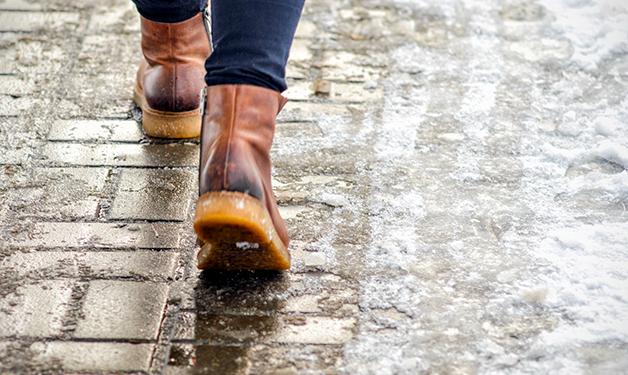
Falls are one of the leading causes of injury among seniors. Dr. Jennifer Davis shares tips on how to maintain your balance and reduce your risk of falling.
Q: Sometimes I miss a step or lose my footing. Why is that?
A: One of the reasons could be due to physiological impairments, such as changes in vision. Annual vision assessments by an optometrist are a useful prevention strategy. If your vision changes, ensure you update your prescription. And if you can, avoid wearing bifocals as they increase your risk of falling. Another reason for stumbling could be due to the presence of potential tripping hazards, like uneven walking surfaces or unanchored rugs. When walking in unfamiliar places it is important to identify and avoid those hazards.
Q: What’s the best strategy to prevent a fall outside during the winter?
A: The best way to prevent slipping outside is to wear rubber-soled shoes, use hand rails if they are available and always pay attention to your environment. Avoid wearing flip-flops, high-heeled shoes and any other footwear that doesn’t provide adequate foot traction.
Q: If I do fall, should I go see a doctor right away?
A: If you’ve hit your head, or if you suspect a broken bone or injurious fall, you should visit an emergency room. For more minor injuries, like soreness or inflammation, you should rest and keep off the affected area.
Q: Could some of my medications make me more likely to fall?
A: Some medications have side effects, such as dizziness or drowsiness, which could affect or impair your balance and increase your risk of falling. This is true even for medications you have been on for a long time. If you are taking four or more medications, drug interactions may occur that could increase your risk of falling. If you’re concerned about medications affecting your balance, you should have your family doctor review your list of medications.
Q: What are some simple exercises to help me stay on my feet?
A: Engaging in regular exercise is important for maintaining your strength and balance. A little bit of exercise every day can provide a lot of benefit, especially exercises that focus on leg and core strengthening, like balancing on one foot. See your physician or physical therapist to receive specific guidance or participate in local classes in Vancouver, such as Osteofit, Healthy Heart or Tai Chi.
Q: How can I reduce the risk of falling in my home?
A: Prevention is key! To prevent indoor falls, you should avoid walking in socks or stockings and keep rooms well-lit and free of clutter, such as loose area rugs or electrical cords. You can also prevent falls by adding safety equipment to your home, such as railings on both sides of stairways, grab bars by the shower, tub and toilet in your bathroom, and extra lighting in dark areas throughout your home. For more information, ask your health care provider about home safety assessments available in your community.



